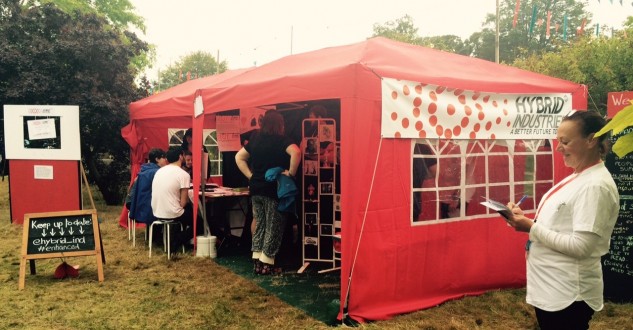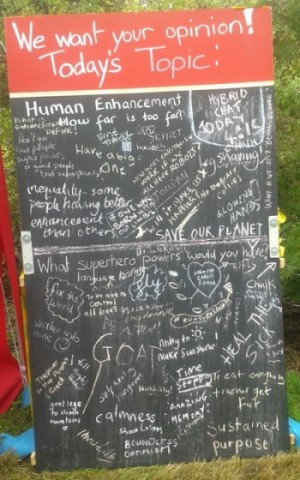Blog post
Prepare to be Enhanced
Hybrid Industries is a company of the future, offering a range of enhancement products including NeuroBANK, allowing you to "recall the most important moments of your life in perfect detail", spectroVISION, an "all-in-one genetic upgrade to perfect your visual-typical field and add far UV and infrared capabilities" and LumiPRO, a ‘bio-monitor’ making health and disease indicators light up on your skin for early and precise diagnosis. Further enhancement packages include chameleon skin, bullet-proof chests, removable limbs, self-moisturising knees and more.
This weekend, festival goers at Green Man festival in the Brecon Beacons had the opportunity to visit a promotion stall for this made-up company as part of the Einstein’s Garden area. Visitors were taken through the full range of fanciful products by more or less persuasive sales representatives, invited to watch advertisements on Hybrid TV, listen to enhancement success stories on Hybrid Radio and submit their own patent applications for further enhancement ideas.

Image credit: yello brick
Hybrid’s catalogue of imagined enhancements is inspired by the work of scientists at the University of Cardiff in the fields of neurostimulation, bioluminescence and genetics in plants and fruit flies. The theatrical set-up aimed to give the scientists a creative introduction and facilitate interactions between them and curious passers-by, but also to stimulate discussion about the future of human enhancement and what it might mean for us as humans and for our societies if they were to become a (commercial) reality.

Plenty of creative ideas for ‘human improvement’ were generated including goat legs, invisibility, boundless optimism and (perhaps inevitably) immortality. But many approached the stall with scepticism and a ‘hold on a minute’ attitude. The potential for creating or exacerbating inequality was something that concerned many, as was the prospect of dual use and enhancements potentially being used maliciously.
Another recurring answer to the question ‘how far is too far’ was the idea of humans crossed with animal and robot features, which to many felt ‘icky’ and ‘just plain wrong’ (dare I say, ‘unnatural’?! More on that here). Some expressed similar feelings in conversations with the geneticists on site about techniques to modify or ‘edit’ genes feeling that it was not a direction we should be moving in (funnily enough the Council is also in the early stages of a project about the ethics of genome editing – find out more here).
Though a manifestly fictional company, Hybrid Industries’ dubious sales approach clearly felt familiar enough to bring out discomfort in some, and confusion in others. Could this actually be real? The neuroscientists demonstrated their research with devices for non-invasive brain stimulation and brain computer interfaces that are already being marketed directly to consumers for gaming and other purposes over the internet. In this setup they were able to clarify the realistic current applications of these technologies, but also to have discussions around future potential, risks, and responsible ways to represent and communicate the science – all issues that were touched upon in the Council’s recent report on novel neurotechnologies (find out more about that here).
Einstein’s Garden is a playful space which facilitates open and friendly interactions between the Green Man festival audience and scientists who may not ‘do’ public engagement on a regular basis. The interactive theatre experience Enhanced showed that it can also give people an opportunity to question and discuss current and future ethical and social implications of science – no mean feat for a gazebo in the welsh countryside!
Enhanced was produced by Einstein’s Garden in collaboration with creative marketing agency yello brick and scientists at Cardiff University including Dr Amit Jathoul, Dr David McGonigle and Gordon Beattie to form part of an area of Green Man festival which features performances, workshops and installations exploring scientific research. The Council contributed to the development of the activity as an advisory partner to help incorporate discussion about bioethics.
Comments (0)
Join the conversation